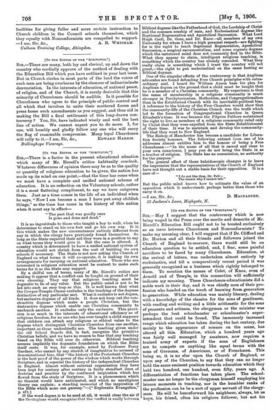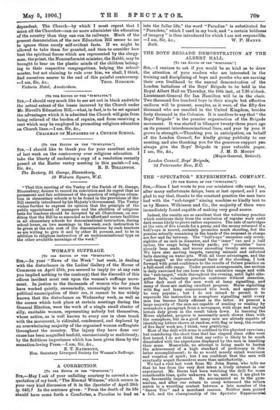[TO THE EDITOR OP THE "SeacTkron."] SIR, — May I suggest that
the controversy which is now being waged in the Press over the merits and demerits of Mr. Birrell's Education Bill ought not to be treated exclusively as an issue between Churchmen and Nonconformists ? To make my meaning clear, I will suggest that if Dr. Clifford and Dr. Horton and all their friends and followers joined the Church of England to-morrow, there would still be an education question to be settled, and, I fear, some painful sacrifices to be faced by many Churchmen. Education, at the revival of letters, was undertaken almost entirely by ecclesiastics, and till a comparatively recent period it was generally recognised as a business which rightly belonged to them. To mention the names of Colet, of Knox, even of Arnold and of Temple, in this connection will sufficiently indicate my meaning. These Churchmen-educationists did a noble work in their day, and it was chiefly men of their pro- fession who handed on the torch of learning from generation to generation. While education was mainly literary, dealing with a knowledge of the classics for the sons of gentlemen, with reading and writing and a little arithmetic for the sons of peasants and artisans, the clergyman or the minister was perhaps the best schoolmaster or schoolmaster's super- intendent that could be found. The immensely increased range which education has taken during the last century, due mainly to the appearance of science on the scene, has altered all this. Education, which hundred years ago• was fairly well managed by amateurs, now requires a trained army of experts if the sons of Englishmen are to compete on anything like equal terms with the ROM of Germans, of Americans, or of Frenchmen. This being so, it is no slur upon the Church of England, or upon any of the Churches, to say that they can no longer hold the same eminent position towards education which they held two hundred, one hundred, even fifty, years ago. A differentiation of functions has taken place. The school- master can no longer be the clergyman himself employing his leisure moments in teaching, nor in the humbler ranks of the profession can he be a sort of upper servant of the clergy- man. He will be henceforward his neighbour, always, let us hope, his friend, often his religious follower, but not his
dependent. The Church—by which I mutt repeat that I mean all the Churches—can no more administer the education of the country than they can run its railways. Much of the .present denunciation of the new Education Bill seems to me to ignore these surely self-evident facts. If we might be allowed to take them for granted, and then to consider how best the spiritual forces which are represented by the clergy- man, the priest, the Nonconformist minister, the Rabbi, may be brought to bear on the plastic minds of the children belong- ing to their respective congregations, helping the school- master, but not claiming to rule over him, we shall, I think, find ourselves nearer to the end of this painful controversy.









































 Previous page
Previous page